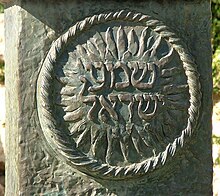
Back Sjema Jisrael Afrikaans Schma Jisrael ALS اسمع يا إسرائيل Arabic اسمع يا اسرائيل ARZ Chema Yisrael Breton Shemà Israel Catalan Shema CEB Šema Jisra'el Czech Shema Yisrael Welsh Shemá Jisrael Danish
It has been suggested that Krias Shema She'Al Hamita be merged into this article. (Discuss) Proposed since January 2024. |
This article needs additional citations for verification. (August 2023) |
 Shema Yisrael at the Knesset Menorah in Jerusalem | |
| Halakhic texts relating to this article | |
|---|---|
| Torah: | Deut. 6:4–9, Deut. 11:13–21 and Num. 15:37–41 |
| Mishnah: | Berakhot ch. 1–3 |
| Babylonian Talmud: | Berakhot |
| Jerusalem Talmud: | Berakhot |
| Mishneh Torah: | Mishneh Torah, Sefer Ahava ch. 1–4 |
| Shulchan Aruch: | Orach Chayim 58–88 |
| Other rabbinic codes: | Kitzur Shulchan Aruch, ch. 17 |

Shema Yisrael (Shema Israel or Sh'ma Yisrael; Hebrew: שְׁמַע יִשְׂרָאֵל Šəmaʿ Yīsrāʾēl, "Hear, O Israel") is a Jewish prayer (known as the Shema) that serves as a centerpiece of the morning and evening Jewish prayer services. Its first verse encapsulates the monotheistic essence of Judaism: "Hear, O Israel: YHVH is our God, YHVH is one" (Hebrew: שְׁמַע יִשְׂרָאֵל יְהוָה אֱלֹהֵינוּ יְהוָה אֶחָֽד׃), found in Deuteronomy 6:4.[1]
The first part can be translated as either "The LORD our God" or "The LORD is our God", and the second part as either "the LORD is one" or as "the one LORD" (in the sense of "the LORD alone"), since Hebrew does not normally use a copula in the present tense, so translators must decide by inference whether one is appropriate in English. The word used for "the LORD" is the tetragrammaton YHVH
Observant Jews consider the Shema to be the most important part of the prayer service in Judaism, and its twice-daily recitation as a mitzvah (religious commandment). Also, it is traditional for Jews to say the Shema as their last words, and for parents to teach their children to say it before they go to sleep at night.[2][3]
The term Shema is used by extension to refer to the whole part of the daily prayers that commences with Shema Yisrael and comprises Deuteronomy 6:4–9, 11:13–21, and Numbers 15:37–41. These sections of the Torah are read in the weekly Torah portions Va'etchanan, Eikev, and Shlach, respectively.
- ^ Moberly, R. W. L. (1990). ""Yahweh is One": The Translation of the Shema". In Emerton, J. A. (ed.). Studies in the Pentateuch. Vetus Testamentum, Supplements. Vol. 41. Leiden: Brill Publishers. pp. 209–215. doi:10.1163/9789004275645_012. ISBN 978-90-04-27564-5.
- ^ "Bedtime Shema". MyJewishLearning.com.
- ^ "Why Say Shema at Bedtime? - Didn't we just say it in Maariv". Chabad.org.
© MMXXIII Rich X Search. We shall prevail. All rights reserved. Rich X Search